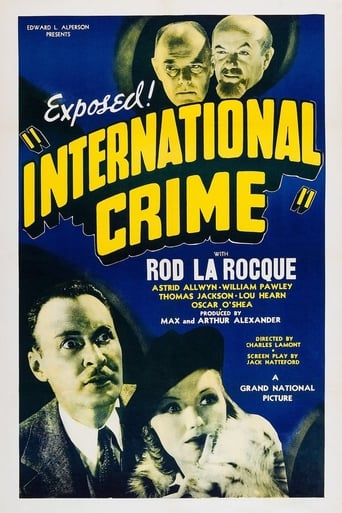


International Crime
The second and final Grand National Pictures film to feature The Shadow, played again by Rod La Rocque. In this version, Lamont Cranston is an amateur detective and host of a radio show with his assistant Phoebe (not Margo) Lane. Cabbie Moe Shrevnitz and Commissioner Weston also appear.
-
- Cast:
- Rod La Rocque , Astrid Allwyn , Thomas E. Jackson , Oscar O'Shea , Wilhelm von Brincken , Tenen Holtz , William Pawley


Similar titles
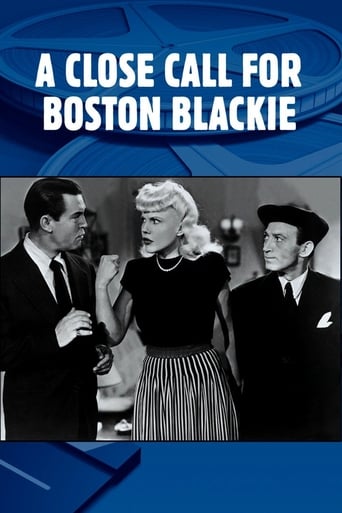

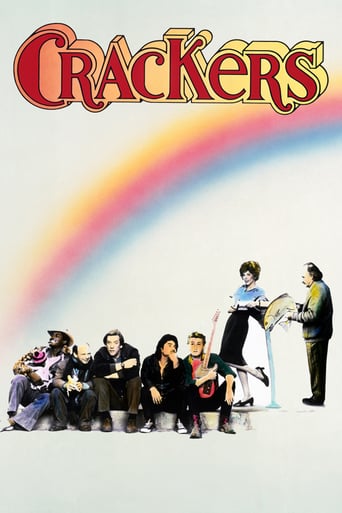
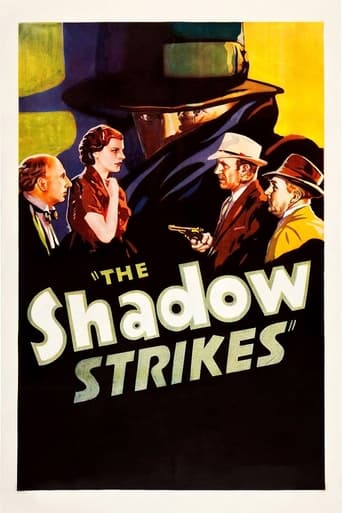
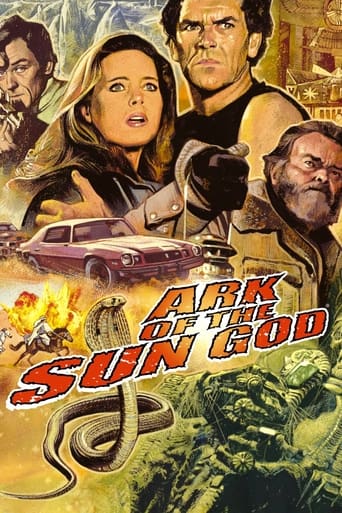
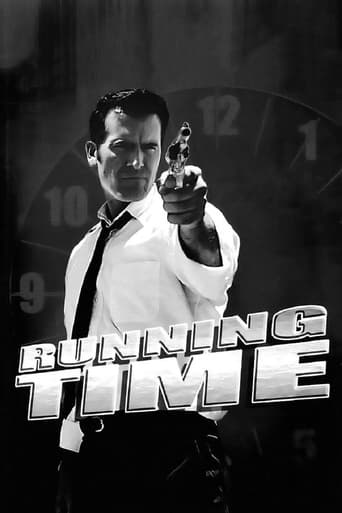
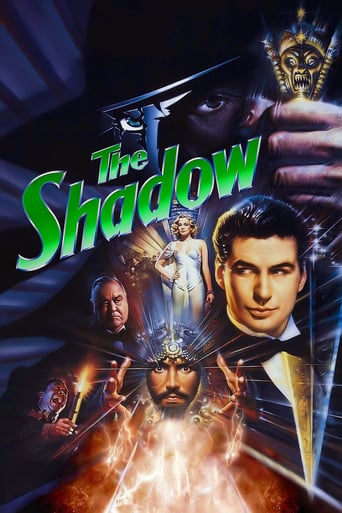

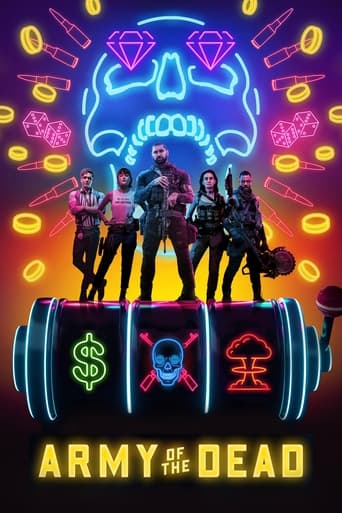
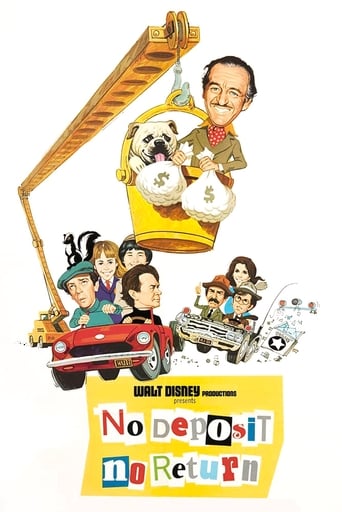
Reviews
Wonderful character development!
Sadly Over-hyped
Boring
Exactly the movie you think it is, but not the movie you want it to be.
I enjoy this movie and have watched it several times (free on Amazon Prime). The colorful characters and some snappy dialog are what attracts me. The mystery aspects and especially Rod LaRocque's cheesy foreign accent (used in a few scenes) are not.I like Astrid Allwyn as the young, eager girl-Friday-wannabe-- slightly ditsy, but not outlandishly so. She gets off some good lines, like this: Waiter: More caviar, madame? Astrid Allwyn: Oh, no! If I eat any more of that buckshot, I'll pass out!Lew Hearn as Moe is a colorful character. He bails out Cranston, and standing outside the cell, Cranston asks how much he owes him. Moe says something like, "Is this a place to talk business? It'll be on your bill."Thomas E. Jackson is enjoyable as always, as a gruff, put-upon police commissioner. I remember him as the gruff, put-upon editor in "Nancy Drew, Reporter." And Peter Potter is memorable as Cranston's assistant, with that sleepy-sounding Oklahoma drawl of his.The mystery, the safe-cracking Honest John, and all that, is not to be dismissed, though there are some corny aspects of the plot. But all in all I like this movie and will no doubt watch it again.
The second of the Rod La Rocque Shadow movies is a vast improvement on the first, and bears no relation to that film or anything else about the character.In this, Lamont Cranston is a newspaper/radio reporter who writes a column on crime, as well as having a radio show. His identity thus is a secret to no one. He is aided by Phoebe Lane, an aspiring reporter, in unraveling a mystery.The mystery is interesting enough to hold interest and involves a crime that baffles everyone. There is some good scenes, especially with Cranston and Phoebe. But the characters (other than the Shadow) are all over the place. Phoebe is sometimes a smart protofeminist and also a complete ditz -- often in the same scene. Her final scene makes no sense after what we've seen before it.But the movie does move along fairly well and the mystery is intriguing enough. It's a decent little film if you want something fun to kill an hour.
In the late 1930's Grand National Pictures released two films based on the popular magazine and radio character, The Shadow. The first outing, 1937's THE SHADOW STRIKES saw silent film star Rod La Rocque donning hat and cape, in a rather bland drawing room mystery. Ironically, this crime thriller without the thrills had been very loosely adapted from a legitimate Shadow Magazine adventure. Considering the rather uninspiring result, it is hardly surprising that the studio decided to rethink their approach before putting a sequel into production. The result of this reconsideration, was INTERNATIONAL CRIME.INTERNATIONAL CRIME is an odd duck of a film. Gone was almost any connection to the Shadow character as he appeared in the magazine series, or even the character from the previous film. This time out, all inspiration was derived from THE SHADOW radio program.The thing that needs to be understood here is that The Shadow is really a split personality. The hawk-nosed avenger with the blazing twin .45's and the legion of secret operatives existed only in the magazines. On radio he was Lamont Cranston, amateur criminologist and "wealthy young man about town", who in the ancient Orient had learned the "power to cloud men's minds so they cannot see him." "Friend and companion" Margo Lane was also an invention of the radio series, though she was later shoehorned into the prose adventures as well. INTERNATIONAL CRIME features almost all the standards of the radio Shadow: Lamont Cranston, amateur criminologist, Margo Lane (though here called "Phoebe Lane") as his Girl Friday, cabbie Moe Shrevnitz, and foil Commissioner Weston. In fact, the only significant player missing is The Shadow himself.Cranston (still played by Rod La Rocque, but with considerably more energy) is now a newspaper columnist and radio personality who goes by the on-air non deplume of "The Shadow". In the middle of a broadcast, his overeager and stereotypically ditzy blonde assistant, Phoebe, hands him an ill advised tip on an upcoming box-office robbery, that is actually a red-herring to draw away the police so that another crime may be more easily committed elsewhere. Already in the doghouse with Police Commissioner Weston for his caustic commentary on the capabilities of the constabulary, Cranston's reputation is now on the line, unless he can solve the real crime, a combination theft and murder, himself. But the sleuthing is never really the main point of the film: the detecting is really just a framework to hang the movie's humorous elements on. At no time is there ever a real sense of danger to the proceedings. From the moment that Phoebe crashes into the middle of Cranston's radio broadcast, the audience knows what kind of film this is supposed to be and just sits back to enjoy the ride.There is one other very odd element to the film that begs noting one that may have gone unnoticed by the movie going public of 1938. The criminal masterminds of the piece are Viennese nobility, plotting to halt a bond issue from foreign businessmen that will finance military forces in their homeland. On March 12, 1938, Austria was officially absorbed into Germany. Therefore the government that these conniving and murderous villains are working against, is the Nazi regime of Adolph Hitler. Today it is remarkable to consider that such a plot device could have been used in the same year that Neville Chamberlain made his fateful, "peace in our time" speech, and impossible to believe that such an element would have been allowed to stand if this film had been made even a year later.While fairly predictable, the film nevertheless rolls along at a good clip, providing a light weight, light-hearted and fairly amusing crime comedy in a similar vein, but a lower rent district, to the Nick and Nora Charles or Mr. And Mrs. Smith adventures. INTERNATIONAL CRIME is both a drastic change and a huge improvement over the feeble and stodgy THE SHADOW STRIKES.
Kind of disappointing to realize that these two Shadow films made contemporaneously with the Shadow pulp magazine and the radio show's original releases are far less faithful to the character's mythos than the 1993 film with Alec Baldwin! The pulp magazine is probably the most intense iteration of The Shadow, with plenty of supernatural adventures and mystical side tracks. The radio show is almost as good, with a little more crime busting/film noir attitude and lots more dealings with common thugs or criminal masterminds than with metaphysical foes.This film and its companion are the most lightweight of the bunch, with a very light tone and no mystical elements whatsoever. Everybody knows LaMont Cranston is The Shadow, who is merely a newspaper columnist and radio show host. None of the "wealthy playboy" secret identity here. None of the secret disguises (unless you count a monocle and a bad German accent), and none of the awesome "metaphysically manipulating the weak minds of criminals" mind tricks. BO-RING! No cool sidekicks; he has only his ditzy assistant, a narcoleptic leg man and a goofy Yiddish-accented cabbie with a gun-shaped cigarette holder to assist him.Going in to this with no prior knowledge of the Shadow character, I could see how somebody would find this to be an enjoyable puff piece. But I was bitterly disappointed, having read (only a few!) of the original Shadow stories from the 30's, and heard a few of the original radio shows. I won't give it the indignity of a one rating, since they did a fair job on a low budget. But a three is as high as I can go.
